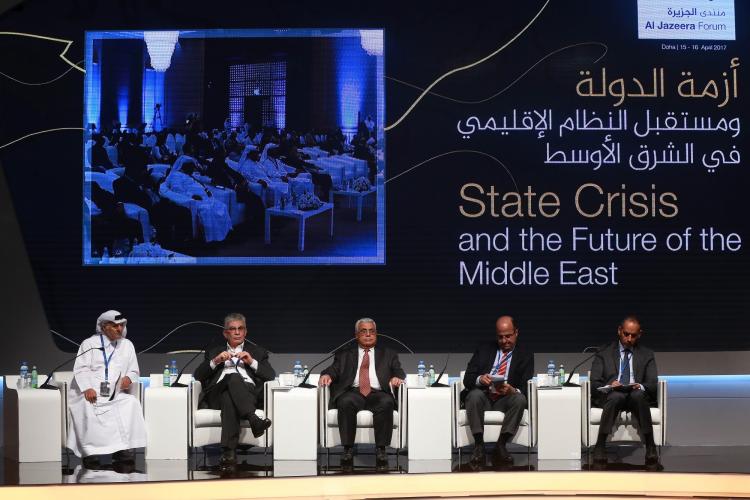
The 11th Al Jazeera Forum, “The State Crisis and the Future of the Middle East”, concluded its two-day series of sessions with a sixth conclusive plenary session entitled, “Where is the Middle East headed?” Chaired by Professor of Political Science at Qatar University Muhammad Al-Musfir, the session brought together researchers and experts who discussed a number of issues, including the standing crises in the Middle East and the fate of the political compromises presented to Syria, Libya and Yemen.
The session tackled the nature of the regional and international arrangements in the Middle East, especially after the emergence of the Islamic State (IS), and explored whether regional or national Arab alliances can play an active role on the regional level. It also addressed the rise of the US and European right-wing parties and its impact on their relations with the Middle East and the Middle East's future.
The participants presented several prospective answers to these pending questions for a better future in the Middle East in light of the current conflicts, internal complications and external interventions. One such solution, the participants maintained, is reaching an agreement on what form of government to adopt in the Middle East countries.
Hassan Nafaa, Professor of Political Science and Former Head of the Department of Political Science at Cairo University, expressed in his presentation his belief that, for a solution to be made possible in the Middle East, the discussion of any solution should shift from forecasting to analyzing the consequences of the Middle East's problems. He added that several factors should be put into consideration: the Arab factor, the regional factor (which includes Turkey, Iran and Israel), and the international factor (the interests of international powers in the Middle East).
He added that although the Arab component is assumed to be the most solid and influential in the making of the region’s future, as it is more relevant geographically and demographically, it should, however, be noted that it is "the weakest when compared to regional and international powers interfering in the region".
The speaker added that Arab countries are weakened due to the many difficulties they face both internally and externally as a result of tyrannical regimes, the absence of the people’s involvement and their identity crisis.
He also pointed out that other regional parties, such as Turkey and Iran, interfere in the Middle East by filling the Arab vacuum with their expansionist agendas. The Zionist player, he maintained, is also a key factor in the region as it aims to achieve several goals in the region in pursuit of complete hegemony.
Adnan Hayajneh, Professor of Political Science at Qatar University, imparted in his speech visions for a better future for the Arab region, without compromising the US relations with the Middle East. He maintained that, "America will continue to protect the existing regimes [as long as they serve] American interests." In terms of regional options, he said, the distribution of power does not serve the Arab component and "Iran's agenda is ahead of the Arab projects in many issues".
Hayajneh added that the Arab regimes are very strong and manipulative vis-à-vis the Arab citizen who is declining and unable to act. According to him, the only way out for the Arab states is "to reach a settlement in Syria where Iran's role retreats and the US role becomes more effective".
Tarik Yousef, Director of the Brookings Doha Center, focused on the issue of the national state and the regional system. He said that the economic aspect of the disintegration is no less dangerous than its regional manifestations.
In light of administrative failure and corruption, the spread of crime and asylum and regional and external factors, any arrangements should take into consideration the changes that take place on the international level, he argued.
He concluded by maintaining that "the political Arab elites need to perform more effectively with regards to the current regional situation, because one of the main reasons for the Arab Spring is their failure and bankruptcy".
Basheer Nafi, Professor of Middle East History and Senior Researcher at Al Jazeera Centre for Studies, revisited in his presentation the history of the modern state and the opposition movements and revolutions that started in Europe and ended in the turbulent Middle East.
He said that the region will inevitably achieve real democracy, but that it may take years or even decades.
Nafi concluded by saying that achieving democratic transformation can be facilitated by a struggle supported by independent state apparatuses, i.e. the judiciary and the ability of civil society to confront the ruling authority.

